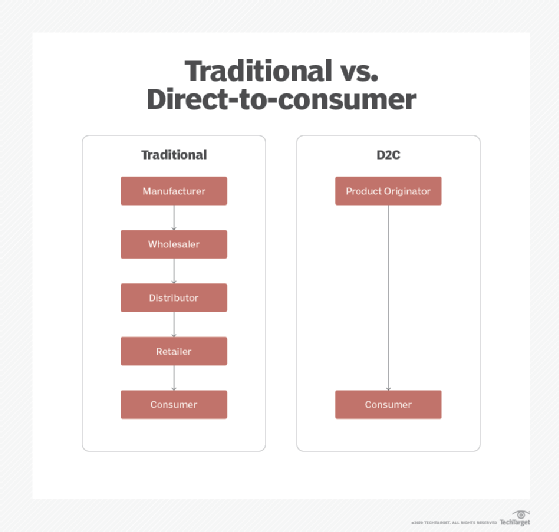Direct-to-Consumer (D2C or DTC)
D2C (Direct-to-consumer, or Direct2Consumer) is a type of business-to-consumer (B2C) retail sales strategy where a business will build, market, sell and ship a product directly to the customer.
Selling D2C streamlines the distribution process by avoiding any middlemen (such as third-party retailers and distribution partners) -- allowing D2C companies to offer products at lower prices than brands using traditional retail business models -- as well as maintain end-to-end control over business operations. With the omission of traditional retail distributors, direct-to-consumer advertising, marketing and sales activities are used to differentiate brands.
Furthermore, by forgoing the traditional retail distribution models, D2C companies can experiment with multiple different distribution channels -- such as direct-selling ecommerce, pop-up shops and social media partnerships.
D2C brands continue to capture more of the American retail market by offering convenience, product quality and price-friendly shipping options for customers. Companies such as Casper mattresses, Dollar Shave Club and Warby Parker -- among other brands -- have established themselves and managed to disrupt their respective industries using D2C retail models.

Pros and cons of implementing D2C strategy
Pros of using D2C include:
- More bottom-line profit control, with no middlemen.
- End-to-end control of the business -- particularly over customer experience, brand image and reputation. Retailers do not typically prioritize or focus on one brand over the others, unless it directly benefits them.
- Direct sales create a channel of communication between the customer and brand. This helps build Brand loyalty, learn customer preferences, generate repeat and recommended purchases.
- Customer data collection from online stores -- with data such as demographics, buyer behavior, web traffic, paid advertisements and remarketing.
Cons of using D2C:
- Competing against retail giants like Amazon and Walmart. Fulfillment particularly can be a challenge, when competing with Amazon's free two-day shipping.
- Must effectively communicate brand values without the support of large resellers.
- Increased marketing, sales and customer service responsibilities.
Examples of successful D2C businesses
Some examples of popular D2C businesses include:
- Dollar Shave Club. A subscription-based service that delivers men's shaving and grooming supplies.
- Keeps. A telemedicine service that provides customers with men's health solutions without having to schedule a doctor's appointment.
- Casper. This mattress company simplifies the experience of mattress shopping by providing a small selection of price-friendly products that satisfy a broad range of customer needs.
- Warby Parker. Sends sample frames for free to customers to try on before they order, aiming for a convenience of choosing eyeglasses on at home.
- Blue Apron. A service that provides prepped and measured ingredients for healthy meals to be cooked at home. Takes out the process of shopping for fresh ingredients.
